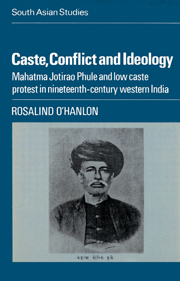 Caste, Conflict and Ideology
Caste, Conflict and Ideology Book contents
- Frontmatter
- Contents
- Acknowledgements
- Notes on translations and area under study, with map
- Part 1 Introduction
- Part 2 Religion and society under early British rule
- 2 From warrior traditions to nineteenth-century politics: structure, ideology, and identity in the Maratha-kunbi caste complex
- 3 The crisis of cultural legitimacy: missionaries, reformers, and Hindu society in the mid-nineteenth century
- 4 The growth of religious reform opinion in western India
- Part 3 Jotirao Phule and his circle: the emergence of a distinctive radical voice
- Part 4 The creation of a lower caste identity in history and popular culture, 1869–73
- Part 5 The lower caste community in contemporary society
- Part 6 Ideology and the non-Brahman movement in the 1880s
- Bibliographic note
- Bibliography
- Glossary
- Index
4 - The growth of religious reform opinion in western India
from Part 2 - Religion and society under early British rule
Published online by Cambridge University Press: 14 October 2009
- Frontmatter
- Contents
- Acknowledgements
- Notes on translations and area under study, with map
- Part 1 Introduction
- Part 2 Religion and society under early British rule
- 2 From warrior traditions to nineteenth-century politics: structure, ideology, and identity in the Maratha-kunbi caste complex
- 3 The crisis of cultural legitimacy: missionaries, reformers, and Hindu society in the mid-nineteenth century
- 4 The growth of religious reform opinion in western India
- Part 3 Jotirao Phule and his circle: the emergence of a distinctive radical voice
- Part 4 The creation of a lower caste identity in history and popular culture, 1869–73
- Part 5 The lower caste community in contemporary society
- Part 6 Ideology and the non-Brahman movement in the 1880s
- Bibliographic note
- Bibliography
- Glossary
- Index
Summary
Introduction
The third and fourth decades of the nineteenth century witnessed the emergence in western India of a small, but well-organised and highly articulate body of reformers. They conceived it as their task to investigate the causes of the apparent backwardness, disorganisation, and impoverishment of Hindu society, and to take the lead in eradicating the features which had caused its decline. In this chapter, we will look at some examples of such reform opinion amongst the western-educated. This will both illustrate the orgins and very wide currency of reform ideas, and provide a contrast to Phule's employment of similar arguments to construct a much more radical critique of Hindu institutions and values. For our examples we will take the newspapers started by the prominent reformer and Professor of Mathematics and Astronomy at Elphinstone College, Bal Shastri Jambhekar; the Marathi Dnyan Prasarak Sabha, the ‘Society for the Spread of Knowledge’, founded in 1848 by a group of reformers and students at Elphinstone College; and the newspapers for the theistic society, the Paramahansa Mandali, founded by Dadoba Pandurang, who succeeded Jambhekar in Bombay as the director of the Normal Class. The Bombay membership of this society was largely drawn from students of the Elphinstone College, the Free Church Institution, and the Robert Money School.
Moderate social reformers shared, then, an acceptance of many of the basic elements of the religious and scientific worldview associated with the Raj. They saw in their application to Indian society the main hope for its social enlightenment and its material happiness.
- Type
- Chapter
- Information
- Caste, Conflict and IdeologyMahatma Jotirao Phule and Low Caste Protest in Nineteenth-Century Western India, pp. 88 - 102Publisher: Cambridge University PressPrint publication year: 1985
